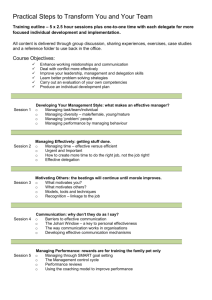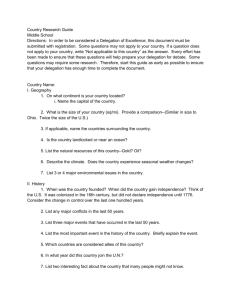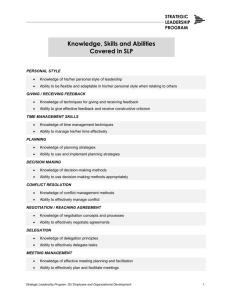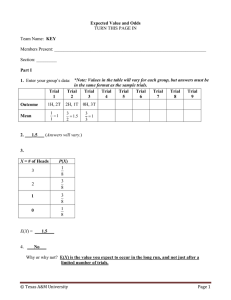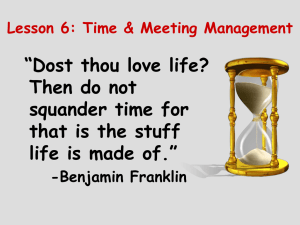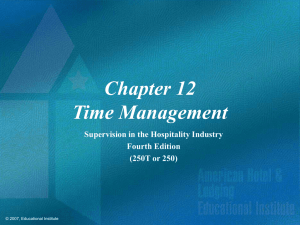Simulating Task Sharing with Delegation for Authority and Autonomy for... Douglas W. Lee
advertisement
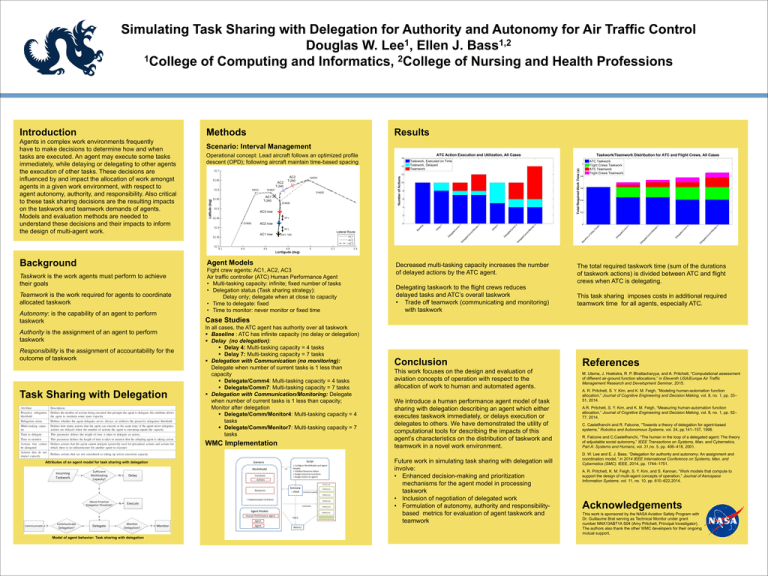
Simulating Task Sharing with Delegation for Authority and Autonomy for Air Traffic Control 1 1,2 Douglas W. Lee , Ellen J. Bass 1College of Computing and Informatics, 2College of Nursing and Health Professions Introduction Agents in complex work environments frequently have to make decisions to determine how and when tasks are executed. An agent may execute some tasks immediately, while delaying or delegating to other agents the execution of other tasks. These decisions are influenced by and impact the allocation of work amongst agents in a given work environment, with respect to agent autonomy, authority, and responsibility. Also critical to these task sharing decisions are the resulting impacts on the taskwork and teamwork demands of agents. Models and evaluation methods are needed to understand these decisions and their impacts to inform the design of multi-agent work. Background Taskwork is the work agents must perform to achieve their goals Teamwork is the work required for agents to coordinate allocated taskwork Autonomy: is the capability of an agent to perform taskwork Authority is the assignment of an agent to perform taskwork Responsibility is the assignment of accountability for the outcome of taskwork Task Sharing with Delegation Methods Results Scenario: Interval Management Operational concept: Lead aircraft follows an optimized profile descent (OPD); following aircraft maintain time-based spacing AC2 T-240 AC1 T-240 AC3 now 60 s AC2 now 60 s AC1 now Model of agent behavior: Task sharing with delegation Lateral Route Agent Models Fight crew agents: AC1, AC2, AC3 Air traffic controller (ATC) Human Performance Agent • Multi-tasking capacity: infinite; fixed number of tasks • Delegation status (Task sharing strategy): Delay only; delegate when at close to capacity • Time to delegate: fixed • Time to monitor: never monitor or fixed time Decreased multi-tasking capacity increases the number of delayed actions by the ATC agent. Delegating taskwork to the flight crews reduces delayed tasks and ATC’s overall taskwork • Trade off teamwork (communicating and monitoring) with taskwork The total required taskwork time (sum of the durations of taskwork actions) is divided between ATC and flight crews when ATC is delegating. This task sharing imposes costs in additional required teamwork time for all agents, especially ATC. Case Studies In all cases, the ATC agent has authority over all taskwork Baseline : ATC has infinite capacity (no delay or delegation) Delay (no delegation): Delay 4: Multi-tasking capacity = 4 tasks Delay 7: Multi-tasking capacity = 7 tasks Delegation with Communication (no monitoring): Delegate when number of current tasks is 1 less than capacity Delegate/Comm4: Multi-tasking capacity = 4 tasks Delegate/Comm7: Multi-tasking capacity = 7 tasks Delegation with Communication/Monitoring: Delegate when number of current tasks is 1 less than capacity; Monitor after delegation Delegate/Comm/Monitor4: Multi-tasking capacity = 4 tasks Delegate/Comm/Monitor7: Multi-tasking capacity = 7 tasks WMC Implementation Attributes of an agent model for task sharing with delegation AC3 T-240 Conclusion References This work focuses on the design and evaluation of aviation concepts of operation with respect to the allocation of work to human and automated agents. M. IJtsma, J. Hoekstra, R. P. Bhattacharyya, and A. Pritchett, “Computational assessment of different air-ground function allocations,” in Eleventh USA/Europe Air Traffic Management Research and Development Seminar, 2015. We introduce a human performance agent model of task sharing with delegation describing an agent which either executes taskwork immediately, or delays execution or delegates to others. We have demonstrated the utility of computational tools for describing the impacts of this agent’s characteristics on the distribution of taskwork and teamwork in a novel work environment. Future work in simulating task sharing with delegation will involve: • Enhanced decision-making and prioritization mechanisms for the agent model in processing taskwork • Inclusion of negotiation of delegated work • Formulation of autonomy, authority and responsibilitybased metrics for evaluation of agent taskwork and teamwork A. R. Pritchett, S. Y. Kim, and K. M. Feigh, “Modeling human-automation function allocation,” Journal of Cognitive Engineering and Decision Making, vol. 8, no. 1, pp. 33– 51, 2014. A.R. Pritchett, S. Y. Kim, and K. M. Feigh, “Measuring human-automation function allocation,” Journal of Cognitive Engineering and Decision Making, vol. 8, no. 1, pp. 52– 77, 2014. C. Castelfranchi and R. Falcone, “Towards a theory of delegation for agent-based systems,” Robotics and Autonomous Systems, vol. 24, pp.141–157, 1998. R. Falcone and C.Castelfranchi, “The human in the loop of a delegated agent: The theory of adjustable social autonomy,” IEEE Transactions on Systems, Man, and Cybernetics, Part A: Systems and Humans, vol. 31,no. 5, pp. 406–418, 2001. D. W. Lee and E. J. Bass, “Delegation for authority and autonomy: An assignment and coordination model,” in 2014 IEEE International Conference on Systems, Man, and Cybernetics (SMC). IEEE, 2014, pp. 1744–1751. A. R. Pritchett, K. M. Feigh, S. Y. Kim, and S. Kannan, “Work models that compute to support the design of multi-agent concepts of operation,” Journal of Aerospace Information Systems, vol. 11, no. 10, pp. 610–622,2014. Acknowledgements This work is sponsored by the NASA Aviation Safety Program with Dr. Guillaume Brat serving as Technical Monitor under grant number NNX13AB71A S04 (Amy Pritchett, Principal Investigator). The authors also thank the other WMC developers for their ongoing mutual support.
